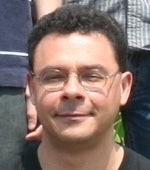
Luis Ibáñez works as Senior Software Engineer at Google Inc in Chicago. Opinions expressed in this site are his own.You can find him in github at: http://www.github.com/luisibanezand in twitter at: http://www.twitter.com/luisibanezHe previously worked as a Technical Leader at Kitware Inc., and Director of Open Source Community Development at the Open Source EHR Agent (OSEHRA). At Kitware he was closely involved in the development of open source software for medical imaging applications, in particular, working with the Insight Toolkit (ITK).Luis is a strong supporter of Open Access, and one of the editors of the Insight Journal, an OA Journal that enforces the verification of reproducibility. In collaboration with other instructors, Luis taught a course on Open Source Software Practices at RPI between 2007 and 2013, and also at the State University of New York at Albany between 2011 and 2014.Luis Ibáñez received a B.S. in Physics from the Universidad Industrial de Santander (Bucaramanga, Colombia) in 1989 and a M.S. in Optics from the same university in 1994. He received a D.E.A and Ph.D. degrees from the Universite de Rennes I (Rennes, France) in 1995 and 2000, respectively. In 1999, Luis Ibáñez joined the Division of Neurosurgery of the University of North Carolina at Chapel Hill and participated as a member of the MIDAG and CADDLab groups. His work at UNC was related to the development of algorithms for 2 and 3D registration applied to image guided surgery. He also participated as developer of the INSIGHT Registration and Segmentation Toolkit sponsored by the National Library of Medicine. Luis Ibáñez joined Kitware, Inc. in February 2002 where he was one of the main developers of the Insight Toolkit (ITK) coordinating its maintenance with other developers and the user community; he is also one of the main developers of the Image Guided Surgery Toolkit (IGSTK) and participated in crafting the operational principles of the Insight Journal. Luis Ibáñez is a strong supporter of Open Access, and the verification of reproducibility in scientific publications and is a regular speaker in ITK training courses, and in events disseminating the principles of Open Source. In August 2014, Luis joined Google Inc as Software Engineer, to work with the corporate engineering team in New York city.

Authored Comments
Hi Mancha,
Thanks for your comment.
You bring a good point about the overall lack of appreciation in our communities. This has sometimes been pointed out as one of the sources of burn out of contributors.
When volunteers work for long hours, for many months, or even years, taking care of things behind the scenes, it is important that those of us, on the receiving end of their work, show some signs of appreciation, or at least acknowledgment of how important their contributions are. It doesn't have to be done every day, but once in a while, it is important to let them know that we have noticed, and we appreciate what they do.
This topic fits into the larger conversation on how important "soft skills" are in any team work, and very particularly in open source communities, where "appreciation", "acknowledgement" and "recognition" are one of the key currencies of a networked world.
Thanks for raising the point about Slackware (and suggesting a proper tag line for it). I have now updated the list in the article. How bad of me to skip Slackware. It was indeed the first Linux Distribution I tried, back in 1996. I was then using one of the i386 unmarked clones, and beating SGI workstations on performance. :-)
It is always tricky to make these type of lists, because at some point we cut a finite number, while Distrowatch, for example, lists 290 Linux distributions. So, my apologies to any other Distribution missing for the list.... No subliminal message of exclusion was intended... but if any of you send me a suggested tag line for your favorite distribution (just as Mancha did), I'll be more than happy to update the article to include it.
Thanks !
Eddie,
This is a great idea.
I'm wondering if we could dig into the history of Linux Distributions and pick a significant date.
For example, in Debian, it seems that the first appearance of the packaging system was back on January 1994:
https://www.debian.org/doc/manuals/project-history/ch-releases.en.html
(would have to find the actual date though...)
For Slackware we could check here:
http://en.wikipedia.org/wiki/Slackware
Another option could be to have an open voting event, and invite packagers from various Linux Distributions to vote for a date that they can call their own.